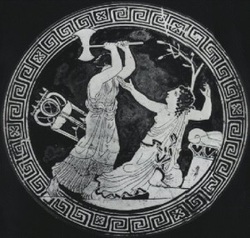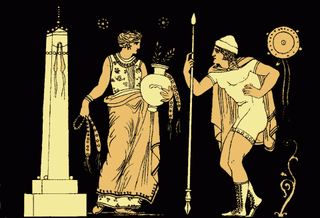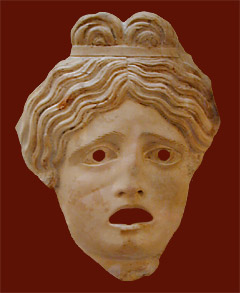|
Put this in your pipe and smoke it (not literally!) Your husband goes off to fight in Troy, but before he leaves, he sacrifices your daughter, Iphigenia, to the goddess Artemis, in hopes that she'll blow some favorable winds his way. Oh please! Then, he's gone ten years -- which might be a good thing, because any normal mother is going to want to lay waste to the man who killed her child. Right? So who could fault you for getting together with another man and plotting some revenge? And to add insult to injury, when your hubby finally does come home from the battlefield, he's dragging a little Trojan hussy behind him (Cassandra -- yeah, that one, who went around proclaiming future gloom and doom). Such is the life of long-suffering Clytemnestra, in the Greek tragedy Agamemnon by Aeschylus (why not call it Clytemnestra?) Okay, so she's a liar, a two-timer and a murderess. He had it coming.  Clytemnestra takes the ax to Cassandra. Of course, in the end, she winds up getting the sharp end of the ax herself, in Sophocles' Electra, when the surviving brother and sister of Iphigenia team up to off Mom and their new stepfather to revenge their father's death. Poor Iphigenia, she's kind of forgotten in all the blood-letting. Oh, wait, she does eventually get a couple of plays of her own, by Euripides (all the Greek playwrights were quite the rivals, determined to outdo each other)! In one play she dies, in the other she is spirited away to become a priestess of the goddess Artemis. Either way, she was the first person to have her life totally screwed up because of the Trojan War. (That's right; it wasn't that air-head Helen...)  Electra and her bro, Orestes, discuss matricide (Project Gutenberg) Now, consider Electra, daughter of Clytemnestra and sister to the ill-fated Iphigenia, who was, as you recall, sacrificed by their father. She plots with brother Orestes to slay Mom and her new husband. The big moral dilemma here? Where does Electra get off thinking she can kill her mother to avenge Daddy, but that her mother was not justified in killing the old fart to revenge her daughter, Iphie? Electra's system of morality, if she has one, seems to be based upon contradiction and self-deception. (Or could it be that Freudian thing, the Electra complex -- the female equivalent of the Oedipus complex?) Or maybe she has convinced herself that she is just right, and that her mother is just wrong. (Sounds familiar to the mother of a teenager...) But, hey, she's a female bent on revenge...who says she has to make sense?
0 Comments
Leave a Reply. |
AuthorTo find out more about me, click on the Not Your Average Jo tab. Archives
February 2024
Categories
All
|

 RSS Feed
RSS Feed